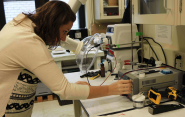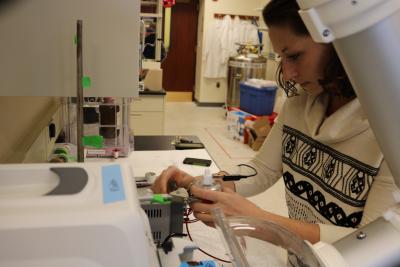Megan O’Connor Wins DOE Fellowship to Advance Recycling Technology

A researcher in the lab of Desiree Plata has won a fellowship from the Department of Energy (DOE) to work on a technology designed to recover valuable rare earth metals in advanced electronics.
 Megan O’Connor, a former grad student in Plata’s lab, will join the Oak Ridge National Laboratory in Tennessee next month as part of Innovation Crossroads, an entrepreneurial research and development program funded by the DOE. There she will get training, support and other resources to commercialize the technology that she developed with Plata, the John J. Lee Assistant Professor of Chemical and Environmental Engineering.
Megan O’Connor, a former grad student in Plata’s lab, will join the Oak Ridge National Laboratory in Tennessee next month as part of Innovation Crossroads, an entrepreneurial research and development program funded by the DOE. There she will get training, support and other resources to commercialize the technology that she developed with Plata, the John J. Lee Assistant Professor of Chemical and Environmental Engineering.
O’Connor said it’s a great opportunity for the project she’s working on.
“There aren’t that many opportunities for these hard technologies and small companies like mine that provide the resources and money to reach the technical milestones needed to get outside funding from bigger sources,” she said.
The technology is an electrochemical precipitation device that uses carbon nanotube filters to separate different elements found in e-waste and electronics manufacturing streams. It’s the basis of Nth Cycle, a company that O’Connor co-founded with Plata.
As part of the fellowship, O’Connor will team with top research scientists with expertise in the same field.
“They wanted to find people who could help us accelerate our technology to where we need to be in two years,” she said. “Two of the principal investigators I’ll be working with work on rare earth recovery. Having that expertise is really going to help me advance the technology and identify which customers are going to be the best for my technology.”
The most pressing goal for the company, O’Connor said, is developing and testing prototypes that work on a larger scale. The fellowship, which provides her with $350,000 in funding and a salary, will go a long way toward that. The program also provides mentoring to help develop the best business model for the technology and opportunities to make critical business connections.
She and Plata have used the technology with synthetic streams, O’Connor said, but they’ll need to prove that it works with real waste streams to convince major investors.
“They’ll want to know ‘Which metals can you separate and recover at the large scale? How much money are you going make? What’s the whole system going to cost?’” O’Connor said. “Innovation Crossroads gives us the funding and time to figure out those big questions.”

